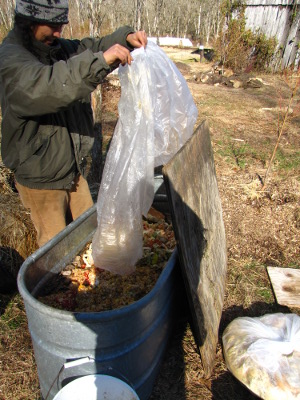
Pounds of worms
 Even
though I'd like a bit more data before building our worm bin, it's
clearly time to move on to the next step --- our compost
holding bin is
already almost full! We've decided to make a simple
bin like Binet Payne's,
but with a false bottom to catch the compost tea. What we haven't
decided yet is how many worms to buy.
Even
though I'd like a bit more data before building our worm bin, it's
clearly time to move on to the next step --- our compost
holding bin is
already almost full! We've decided to make a simple
bin like Binet Payne's,
but with a false bottom to catch the compost tea. What we haven't
decided yet is how many worms to buy.
You
need two pounds of worms per pound of daily food scraps,
and if you factor in the no-food weekends, we're currently clocking in
around 17 pounds of scraps per day. But 34 pounds of worms would
cost around $850, unless we can find a source of worms in bulk.
Of course, worms will
reproduce, and under good conditions Binet Payne
estimates that one of her bins stocked with 8 pounds of worms will come
up to full production (64 pounds of worms) in 3 months.
Currently, I'm budgeting $100 for worms, figuring we'll have to build
some additional compost holding bins to use the extra food scraps for
the first few months. If you know of any bulk sources of compost
worms to make my worm dollars go further, I'd appreciate your advice!
Want more in-depth information? Browse through our books.
Or explore more posts by date or by subject.
About us: Anna Hess and Mark Hamilton spent over a decade living self-sufficiently in the mountains of Virginia before moving north to start over from scratch in the foothills of Ohio. They've experimented with permaculture, no-till gardening, trailersteading, home-based microbusinesses and much more, writing about their adventures in both blogs and books.
Want to be notified when new comments are posted on this page? Click on the RSS button after you add a comment to subscribe to the comment feed, or simply check the box beside "email replies to me" while writing your comment.

I started to comment a minute ago and I don't know what key I hit but something happened -- please disregard my last -- here is my comment:
You can stretch your worm budbet by buying a blender and pureeing some of the food scraps -- maybe, at least, for a few smaller bins that are meant to be incubators. In my bins, when conditions are very dark, very moist and there is a regular addition of pureed scraps, the worms increase exponentially.
Also, when you're pureeing food you need to add water to the mix, and this saves time in that it's two steps combined into one -- food and moisture being added in one step. When I don't use pureed food, I find the bedding dries out and I spend time misting the bedding or soaking it. With purreed food, I slosh it all over the dry areas of bedding, add new bedding on top (to keep out light, to keep down flies and as next weeks' bedding) and voila, done!
You can easily get all the worms you need through reproduction -- very dark, good temp, very moist conditions with adequate bedding and lots of food.
J --- I tend to agree with you that our worms will grow fast if we keep the conditions optimal. However, I suspect it will still be months before we'll have enough to compost all of the scraps from the school!
David --- In our holding bin, we're using wood chips to add the carbon, but in our worm bin we plan to add shredded paper since it keeps lots of air pockets and holds moisture to make worms happy.